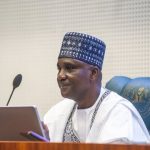Nigeria’s headline inflation rate has increased to 24.23% in March 2025, up from 23.18% in February, reflecting mounting pressure on household incomes and the cost of living.
This significant rise is a cause for concern as it can impact economic stability.
The 1.05 percentage point increase over the month indicates rising costs of goods and services, which can have far-reaching implications for the economy.
The breakdown of inflation rates shows that the food inflation rate eased to 21.79% in March 2025 from 23.51% in February 2025.
Persecondnews reports that core inflation, which excludes volatile agricultural products and energy, quickened to 24.43% from 23.01% in the previous month.
On a monthly basis, consumer prices rose by 3.90% in March, accelerating from 2.04% in February.
In comparison to previous years, Nigeria’s inflation rate has fluctuated significantly.
In March 2023, the headline inflation rate was 22.04%, while in February 2023, it was 21.91%.
The inflation rate increased substantially in 2024, with a headline inflation rate of 33.20% in March and 31.70% in February.
More recent data shows that the inflation rate continued to rise, reaching 34.80% in December 2024 and 33.88% in October 2024.
The increase in inflation rate is attributed to various factors, including increases in prices of essential goods and services.
Although the National Bureau of Statistics (NBS) is yet to officially release the figures on their official channels, the data highlights the challenges facing the economy and the need for policymakers to address the rising cost of living.
Details shortly…
























Leave a comment